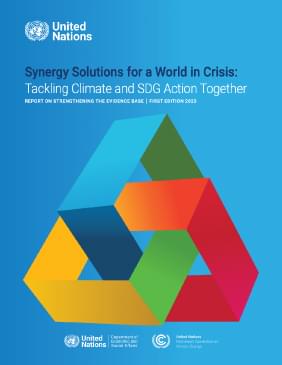Before ISAP: Thematic Tracks 1 (BT-1)
- 14 December 2023
- JST 16:00 - 17:15 (GMT+09:00)
- Simultaneous interpretation
Summary
The event featured an overview of “Climate Action and SDG Synergies: Strengthening the Evidence Base for Synergetic Action” (“Synergies Report”), and invited experts as well as representatives from the Ministry of the Environment (MOEJ) to participate in the discussion.
The first speaker confirmed that climate and SDG synergies remain the top priority. The second speaker explained that a synergistic approach was important to achieve a net zero, sustainable, environmentally friendly, circular society and that the Circulating and Ecological Sphere (CES) concept could achieve multiple SDGs. The third speaker further explained that while synergies are being increasingly recognised and spreading, it is necessary to establish an easily accessible data analysis and information knowledge platform for policymakers.
The panel discussion involved three panelists. The fourth speaker focused on the basic urban services needed for potential environmental and health gains and co-benefits to combat climate change. The fifth speaker introduced MOEJ’s efforts to address the climate change crisis, such as its proposed resolution on synergies, biodiversity loss, and pollution for UNEA6. The sixth speaker described how the Regional Climate Consortium for Asia and the Pacific (RCCAP) also focuses on sustainable development and climate empowerment for certain groups, such as women, youth and indigenous communities.
Key Messages- A synergistic approach can effectively and simultaneously address the global challenges to build a net zero, sustainable, nature-friendly and recycling-oriented society by 2050. Approaches that provide co-benefits, such as reduced air pollution and increased health, should also be considered.
- The Asia–Pacific region produces around 50% of global emissions, 70% of which come from urban areas. Therefore, it is important to transition to low-carbon cities, as this aim is linked to many SDGs, such as health, infrastructure, poverty, and security.
- Stakeholder engagement is a core element of a fair and just transition to net zero and a climate-resilient future.







